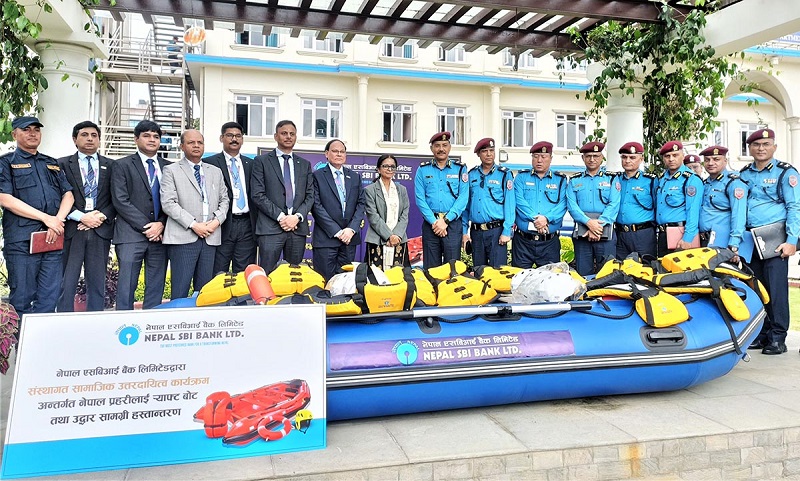Nepal Rastra Bank Issues New Provisions for Branchless Banking Services
14th September 2022, Kathmandu
A concept brought to provide financial access simply and easily to places where there are no bank branches can be considered branchless banking services. Under this, in places where the service of the bank is not available, a contract is made on behalf of the bank with a local merchant or customer as an agent.
Agents provide local services such as account opening, depositing, withdrawing, remittance payment, and small loan investment through machines provided by the bank.
According to the instructions of Rashtra Bank, ‘A’ class commercial banks and ‘B’ class development banks are allowed to operate branchless banking services.
However, so far only commercial banks are providing such services. Banks and financial institutions have the right to extend branchless services in areas where there are no branches except in metropolitan cities, sub-metropolitan cities, and municipalities.
Such banking services are more available in remote areas than inaccessible areas. In the context of Nepal, branchless banking services are considered to be cheap and convenient compared to other banking services.
When banks are unable to expand physical branches in remote areas, they provide banking services through bank employees. Such banking services were used extensively during the recent earthquake to distribute payments to villages.
Such banking services are providing banking services to the backward, remote, and remote people. To expand a branch, a bank has to spend about 40 million rupees on the construction of a building, but when providing branchless banking services, banks do not need to spend money on physical construction, so the banks consider this service to be effective. Everest Bank started branchless banking services in Nepal.
In branchless banking services, all the service facilities introduced by the banks can be provided. Branchless banking services have played an important role in increasing financial literacy in Nepal.
Nepal Rastra Bank has recently issued instructions to further strengthen the arrangements related to branchless banking services and authorized representatives.
Provisions related to the National Bank’s branchless banking services, agreements between banks and financial institutions and customers, agreements with official business representatives, selection of representatives, third-party service providers, approval of the Rastra Bank to close branchless banking services, official representatives of payment service providers other than banks and financial institutions. And has given instructions on cancellation and defense.
According to Rashtra Bank, banks and financial institutions that conduct branchless banking transactions should at least write in the Nepali language clearly and unambiguously so that it can be easily understood in the contract. If a customer wants to make such an agreement in the English language, it can be done.
It should be mentioned whether or not the services of customers who have not received service for a long time will be deactivated. It should be mentioned the risks that arise when the customer does business using public computers or international networks.
Similarly, the service provider banks and financial institutions authorized professional representatives and client’s jurisdiction, work, duties and responsibilities, fees received from clients, and distribution of income, banks or financial institutions are prepared to be alert to situations where any obstacle is created between themselves and the agent and more risks arise. He said to make a contingency plan.
The final responsibility for hearing complaints, dispute resolution, and payment-related issues, issues that make business safe and reliable such as software, website security, customer ID and password, and so on.
Under inspection and supervision by the regulatory body or the designated authority, it is said to provide the necessary data, details, information, and documents and the duration of the contract, the renewal of the contract, and the amendment of the contract. Banks and financial institutions have said that if the tasks mentioned in this directive are to be carried out through a representative appointed by the institution itself, the competence test will be conducted as follows when choosing such a representative.
It is mentioned that a mechanism should be developed to identify representatives capable of fully managing various types of risks that may arise while operating services related to branchless banking transactions. Effective and verifiable procedures should be adopted by the organization itself to reduce potential risks. Before selecting any new representative, minimum basic criteria and selection process should be decided.
If banks and financial institutions perform the tasks mentioned in this directive through a representative appointed by the institution itself, the competence test shall be conducted as follows while choosing such a representative. It is necessary to develop a mechanism to identify representatives capable of fully managing various types of risks that may arise while operating services related to branchless banking transactions.
Effective and verifiable procedures should be adopted by the organization itself to reduce potential risks. Before selecting any new representative, minimum basic criteria and selection process should be decided. For the effective management of the representative, arrangements should be made to test the performance of the representative at certain time intervals by the concerned bank or financial institution.
For this, early warning signs should be fixed and corrective measures should be taken. To use the technical services required for branchless banking transactions, a separate agreement will have to be made with the third party that provides such services.
In the course of providing such services, the provision that this bank can inspect and supervise the operator, including other parties that have not been granted a license by this bank, should be disclosed in such agreement.
Before selecting the third party, minimum basic criteria and selection process should be decided. When entering into a contract with a technical service provider, the work, duties, and rights of such a company should be mentioned, including the arrangements for compensation and compensation for the damage caused to banks/financial institutions and customers due to technical problems.






